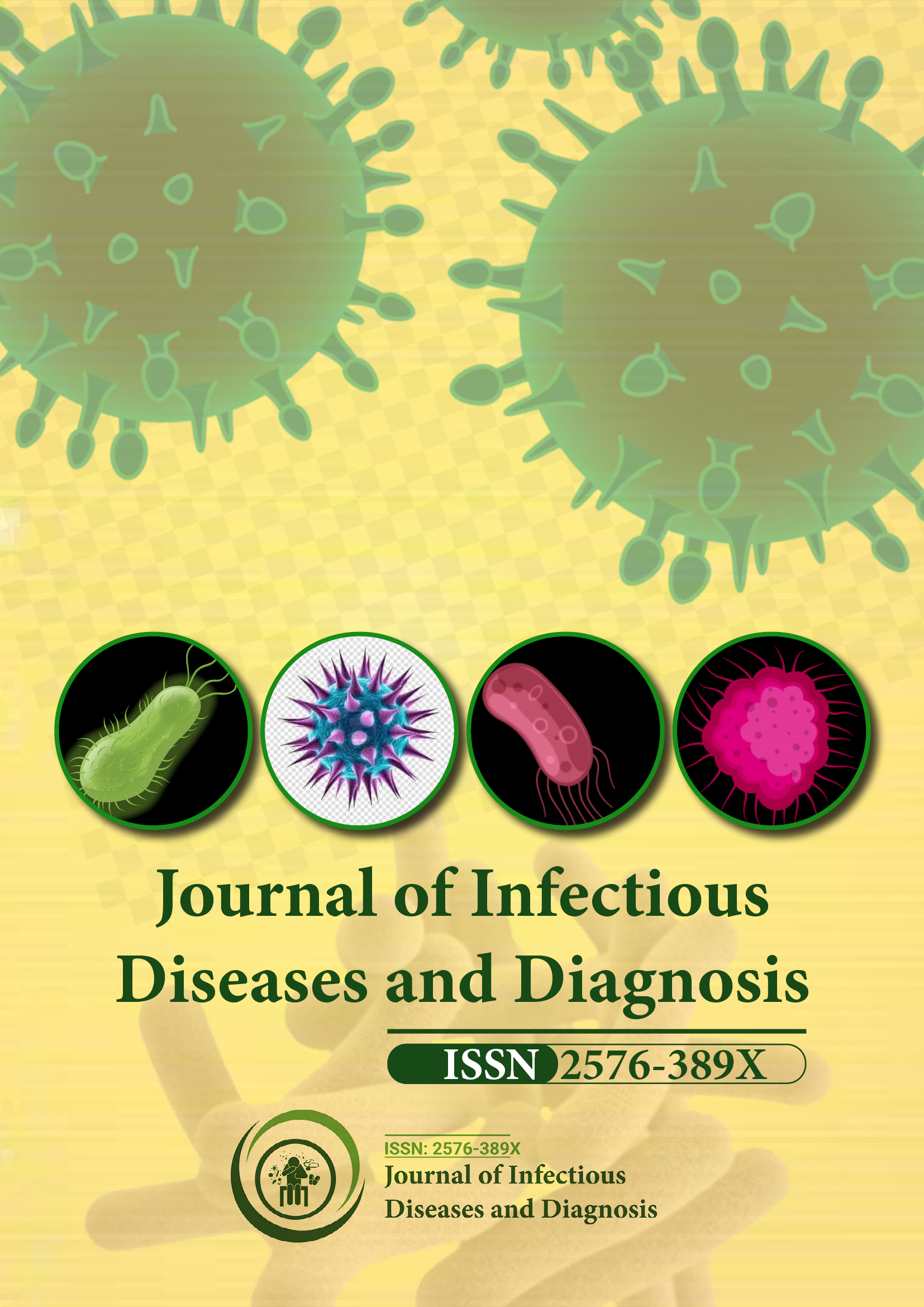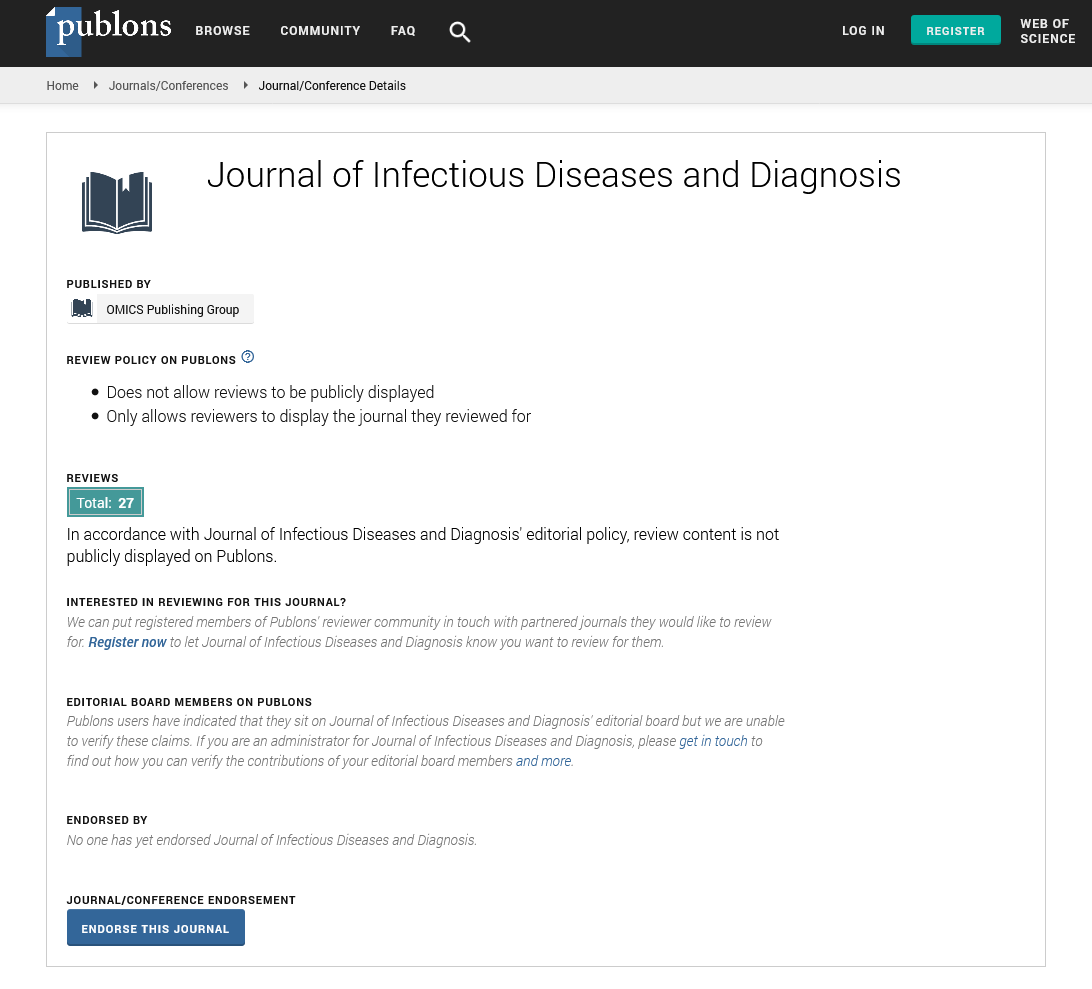Indexed In
- RefSeek
- Hamdard University
- EBSCO A-Z
- Publons
- Euro Pub
- Google Scholar
Useful Links
Share This Page
Journal Flyer

Open Access Journals
- Agri and Aquaculture
- Biochemistry
- Bioinformatics & Systems Biology
- Business & Management
- Chemistry
- Clinical Sciences
- Engineering
- Food & Nutrition
- General Science
- Genetics & Molecular Biology
- Immunology & Microbiology
- Medical Sciences
- Neuroscience & Psychology
- Nursing & Health Care
- Pharmaceutical Sciences
Perspective - (2022) Volume 7, Issue 1
Pharmacological Treatment for Patients with COVID-19
Tingyi Wen*Received: 02-Jan-2022, Manuscript No. JIDD-22-13662; Editor assigned: 05-Jan-2022, Pre QC No. JIDD-22-13662(PQ); Reviewed: 19-Jan-2022, QC No. JIDD-22-13662; Revised: 26-Jan-2022, Manuscript No. JIDD-22-13662(R); Published: 31-Jan-2022, DOI: 10.35248/2576-389X.22.07.166
About the Study
The best treatment for COVID 19 is unknown, as many drugs are under investigation. We determined the outcome of COVID 19 patients treated with various drugs. This studies published in Ovid MEDLINE, EMBASE, CINAHL, and the Cochrane Central Register of Controlled Trials. Patients with COVID 19 were treated with any drug and included a randomized controlled trial (RCT) compared to another drug, placebo, or standard of care.
Coronavirus Disease 2019 (COVID19) is a rapidly prevalent and deadly pandemic caused by the severe acute respiratory syndrome coronavirus 2 (SARSCoV2). Disease symptoms can range from mild to moderate influenza like symptoms to severe acute respiratory disease syndrome (ARDS) necessitating admission to the intensive care unit (ICU) for ventilator and hemodynamic support, and leading to fatalities which are more prevalent in adults and older individuals with comorbidities. While mild to moderate COVID19 is a self-resolving disease, pharmacological treatment might be indicated in more severe cases, and includes drugs that target either key steps of the virus life cycle or the host immune response to SARSCoV2. Given the current lack of evidence to support the use of most drugs, the use of COVID19 pharmacological therapies is recommended mainly in the setting of clinical trials.
There is an urgent need to establish the optimal pharmacological treatment of patients with COVID19. We aimed to assess the effect of different pharmacological treatments on outcomes in patients with COVID19. Remdesivir was found to be associated with shortened time to clinical improvement in patients hospitalized with moderate to severe disease. In addition, an improved survival rate was noted for steroids administered to patients, especially those who required mechanical ventilation and/or supplemental oxygen at diagnosis. Lopinavir/ritonavir was not associated with clinical improvement and did not demonstrate mortality benefit. HCQ administered to outpatients or inpatients did not reduce the severity of disease or hospitalization rates, enhance virological clearance, improve symptoms, reduce need for respiratory support or prevent death. Investigation of other immunomodulatory agents as a single agent has shown less promising results, and published articles were limited by small number of patients.
Remdesivir is associated with a shorter time to clinical improvement in patients admitted with moderate illness and its use should be supported by future studies. Currently, there is no evidence to support the use of HCQ in outpatients with mild illness or in patients with mild moderate illness, or the use of lopinavir / ritonavir in inpatients. Our systematic review supports the use of steroids in critically ill patients. Investigate the role of pharmacological treatment in adults in some underlying comorbidities (e.g., human immunodeficiency virus infection) or in other specific populations (e.g., pediatric population, pregnant women) that have been largely ignored by RCT. is needed. In addition, the role of steroids in the management of moderately severe COVID19 and the optimal dose and duration of corticosteroid therapy in severe cases should be further investigated. The more RCTs are published, the more meta- analyses of the effects of various pharmacological therapies may be possible.
Citation: Wen T (2022) Pharmacological Treatment for Patients with COVID-19. J Infect Dis Diagn. 7:166.
Copyright: © 2022 Wen T. This is an open-access article distributed under the terms of the Creative Commons Attribution License, which permits unrestricted use, distribution, and reproduction in any medium, provided the original author and source are credited.

